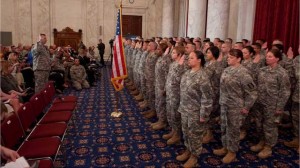
Lt. Gen. Jack C. Stultz, Chief U.S. Army Reserve reenlists 60 soldiers at the U.S. Army Reserve National Capitol Reenlistment ceremony in 2010 on Capitol Hill in Washington, DC. (PRNewsFoto/U.S. Army Reserve)
Many of the stresses that plagued Robert Bales, the Army sergeant accused of murdering 16 Afghan civilians, including nine children, in a shooting rampage, are familiar to America’s armed forces. We’ll probably never know with certainty, but multiple deployments, lack of promotion, physical injuries, possible PTSD and high mortgage debt — any or all may have been factors in the March 11 attack.
Organizer Aaron Hughes writes on the Iraq Veterans Against the War website that many Afghan veterans see the incident as “not a case of one ‘bad apple’ but the effect of a continued U.S. military policy of drone strikes, night raids, and helicopter attacks where Afghan civilians pay the price.” Those veterans, he says, “hope that the Kandahar massacre will be a turning point.”
In today’s New York Times, reporter James Dao delves into Bales’ personal life, looking for clues to explain his behavior.
“Three deployments in Iraq, where he saw heavy fighting, and a fourth in Afghanistan, where he went reluctantly, left him struggling financially, in danger of losing his home.”
The Washington Post reported on Saturday that, three days before the shootings, Bales and his wife decided to put their house in Tacoma, Washington, on the market, for $50,000 less than they paid for it. The Post noted “years of overseas duty on a sergeant’s salary had squeezed the family’s resources to the breaking point.”
The Obama administration has pledged in recent months to go after mortgage firms and banks that have participated in predatory lending and foreclosure proceedings on members of the military, and a fraction of the recently announced $25 billion mortgage settlement between banks and state and federal governments will go to armed service members whose homes have been improperly foreclosed upon since 2006. BusinessWeek reports that the Consumer Financial Protection Bureau has even started a database to track offenders who repeatedly prey on deployed soldiers:
“I continue to hear stories of service members and veterans being ripped off by businesses that see our troops as easy targets for a quick profit,” Holly Petraeus, associate director of the Consumer Financial Protection Bureau’s Office of Servicemembers’ Affairs, said at a Jan. 25 press conference in Washington. Petraeus is the wife of retired Army General David Petraeus, now director of the Central Intelligence Agency.
For those who are managing to pay back their loans, many are finding the need for other ways to get by. Late last month The Austin American-Statesman reported that food stamp usage among soldiers and their families at Fort Hood “has ballooned, from about $285,000 in 2001 to $1.4 million last year.” Low pay and battlefield injuries are contributing factors.
“‘You create a new dynamic to the system: Someone comes home (injured) with a spouse who perhaps has been another breadwinner but because of the injuries becomes a caregiver,’ said John Smith, a spokesman with Operation Homefront. ‘You now have a situation where assistance may be needed. That always happens during conflicts, but it’s happening a lot in this conflict.'”
“Because of better armor and advances in battlefield medicine, a far higher percentage of the severely wounded have made it home from Iraq and Afghanistan than did from previous wars.”
According to the Iraq and Afghanistan Veterans of America (IAVA), in 2011, “the average unemployment rate for new veterans aged 18-24 was 30.2 percent.” Early numbers for 2012 show a modest improvement, and the organization hopes that the White House’s Joining Forces initiative, Congress’s VOW to Hire Heroes Act and pledges made by private sector companies will continue to push new veteran employment numbers upward.

